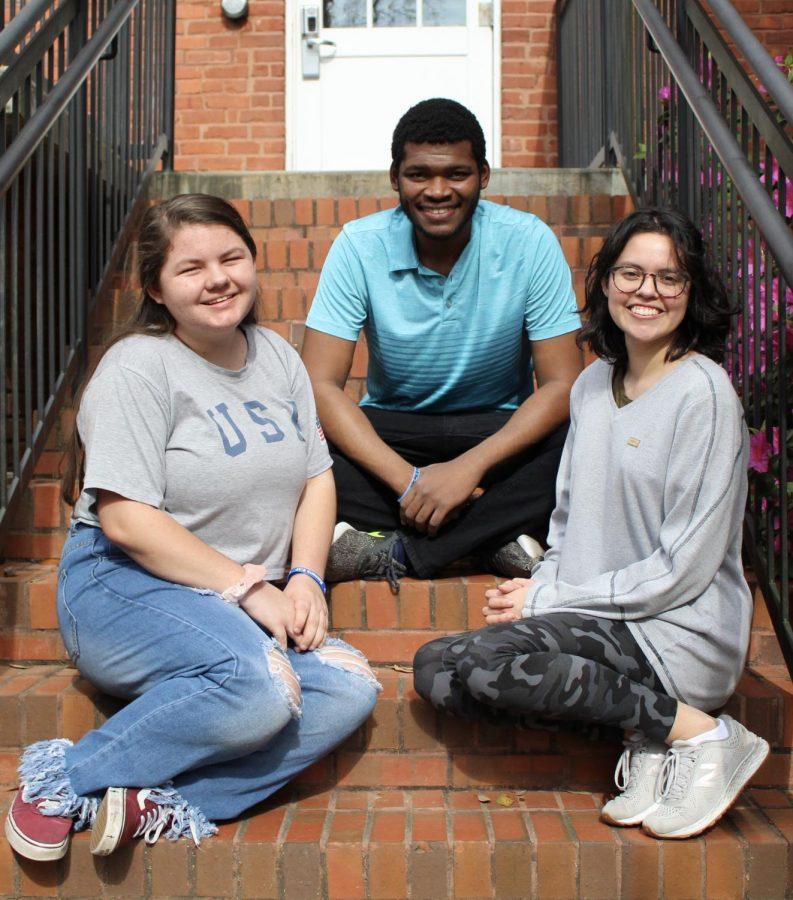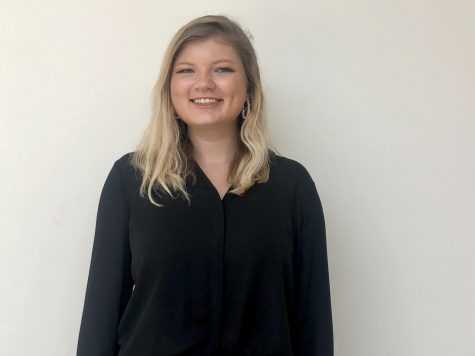The Road to Success: GS First Generation College Students Share Their Experiences
Chloe Johnsen, left, Fred Smith, middle, and Rachel Rubio, right, are all first generation college students. Photo by: Tamara Tanksley
October 6, 2020
Over the past five years at Georgia Southern, there has been a steady increase in the percentage of first generation college students, with the highest being a rise from 27.7% in Fall 2016 to 34.1% in Fall 2017. However, in Fall 2018, the number dropped down to 23.5%.
Being a First Generation College student is a great accomplishment but also comes with many obstacles–beyond even that of tuition. I spoke with a number of first generation college students about their stories while also offering an in-depth look at the TRIO Student Support Services program offered here at GS.
Leslieann Harris, Director of TRIO Student Support Services
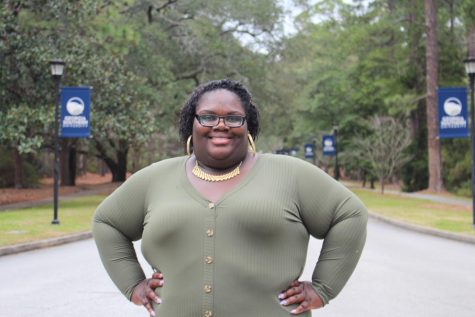
TRIO Student Support Services (SSS) at GS offers many services to students who qualify, including mentoring, financial literacy counseling, individualized academic advising and priority tutoring.
Leslieann Harris, director of TRIO SSS, earned her Bachelor’s of Science in psychology and a Master’s of Science degree in college student personnel administration. She also plans on getting her educational doctorate degree (EDD).
It is important for Harris to see the program succeed because she is also a first generation college student. She was involved in TRIO SSS when she was an undergraduate, and she credits her success today to that program.
“When the opportunity came for me to work here, I was incredibly excited to be able to give back to the organization that I credit with my success, and I have been able to reap the benefits of a TRIO program,” said Harris.
Having been a first generation college student herself makes Harris give 150% to her job. There are a lot of good resources on campus, but Harris wants her students know that no matter what she is there for them. She said she is always going to make sure her students are taken care of because she wants them to feel that they are supported and are being set up for success.
Harris feels that the first generation college student population at GS is many times overlooked.
“We sometimes talk about how these identities are what you would consider to be invisible identities, right?” said Harris. “And so I’m a woman of color and you can see that, but you can’t tell that I’m first-gen unless I tell you, and so it’s important for for students to be able to recognize that part of them, and I think take pride. Just because that’s a part of them does not mean that they cannot succeed. So, I’m excited about the work that we do here in this office.”
The biggest challenge Harris faced was her pride. She described herself as being very stubborn when she entered college.
“So I was like I’m from the hood, like I’m from this rough part of town, and I’ve been able to overcome that and make it to college by myself, so I had this mentality like I didn’t need anyone’s help,” said Harris.
When Harris failed her first test, she realized she was not going to be able to do this by herself. She said she needed to get over her pride and get help.
Harris found herself comparing herself to others who have come from a family of college graduates.
“And so I remember going to college and having friends who were freshmen like me driving like Lexuses and BMWs … and be able to call their parents and their parents help them with money for books or give them money for this and that, and I was like, I have to work four campus jobs to be able to do stuff like that and so there was a lot of comparing, but being involved in programs like TRIO helped with that because I was surrounded by students who were just like me,” said Harris.
Harris is very determined and has received a lot of support from her parents. She’s also the fourth of six children, and her mother has always told her she needs to be the one to make it out and make a difference.
“I like what I do here on Georgia Southern’s campus because I get to work with students who like me have to go through the obstacles of being first-gen,” said Harris. “I’m very open with students about my story because I want them to know that you can overcome this, you can make it, you can achieve your your goals and your dreams.”
What College Means to Her
“I think in terms of being first-gen and being from a low-income background, college means ability to be able to move not only current generations but future generations of your family forward and being able to build a stronger foundation in the hopes of being able to build generational wealth,” said Harris.
Chloe Johnsen
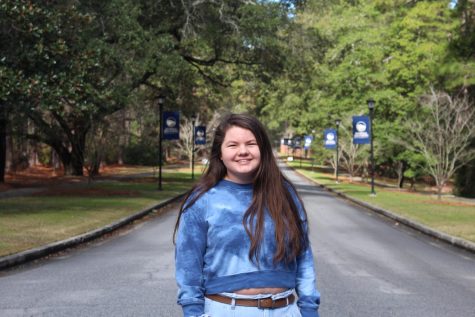
Growing up, Chloe Johnsen, freshman Biochemistry major, experienced several instances of housing insecurity and homelessness. Her parents had gotten divorced, and her dad lost his job at the same time.
In 2008, she lived in motels with her dad and three little brothers for about a year when she was six years old.
In 2012, she couch surfed at her aunt’s with her mom and brothers for about three months when she was 10 or 11 after her mother’s breakup with her current boyfriend at the time.
In 2016, she lived in her father’s car and RV with her little brothers for a period about four or five months when she was 15.
During this time, Johnsen felt very stressed.
“And all my friends were having sleepovers and stuff like that,” said Johnsen. “It was that season where everyone has a birthday. And I couldn’t invite anyone over to my house and I always had to make up an excuse for why I couldn’t do this or that thing or why I couldn’t hang out with them because I didn’t have any money. And so it was just really, really depressing and stressful.”
Everything took much longer than it had before, and she had almost no free time. Johnsen had to take showers at a gym that her dad had a membership to.
“Instead of it taking like 20 minutes to get ready for school, it took like three hours because we had to drive to the shower. We had to find somewhere where we could change like a public bathroom.”
Johnsen also found herself struggling academically. She explained that it was really hard because teachers would assign things that she just couldn’t do. Johnsen didn’t have a place to study, and she didn’t have a laptop or television, so anything to do with technology was nearly impossible.
She said she spent a lot of time going to McDonald’s and using the WiFi on a Blackberry to do homework.
“I almost failed English because I didn’t have anywhere where I could study,” said Johnsen. “I didn’t have a place to sit down because I was always in a cramped car or hotel room.”
She was getting little sleep, averaging five to six hours a night. When sleeping in the car, her dad took out most of the seats. Johnsen slept in the back seat, and her brothers slept where the middle seats would be. Her dad would sleep leaning back in the driver’s seat. She did not feel safe the nights she had to sleep in the car because her dad didn’t have a good neighborhood they could stay in.
“Many of these neighborhoods were crime ridden and dangerous at night and the ones that weren’t had neighborhood watches that wouldn’t let us stay,” said Johnsen. “Even when we tried staying in more safe, suburban neighborhoods, just being out in the open in the minimal security offered by a car made me nervous because breaking in was super easy.”
The biggest thing Johnsen struggled with was coming to terms with the fact that she wasn’t going to be comfortable anymore.
Johnsen wouldn’t entirely skip meals very often, but she would never have a lot of food to eat.
“There weren’t very many occasions where I had to,” Johnsen said. “I remember one specific time that I was with my dad, and he had like two cans of Chef Boyardee ravioli for me, and I have three little brothers, and we had to stay with him for like four days, and that’s all the food we had.”
The hardest thing about not having a permanent residence was letting down her little brothers. At the time that the biggest problems occurred, they didn’t know exactly what was going on and thought of the situation as being a road trip. They would always ask to do something fun like go to the movies.
“I guess my parents were just sad or whatever because they kind of put the burden on me to like let them down, so making sure that they knew we were okay, I guess,” said Johnsen.
Johnsen spoke out against the stigma with homelessness.
“I think most people assume that homelessness is due to like a personal failing,” said Johnsen. “Like you didn’t work hard enough or you didn’t try. But I know both my parents spent so long looking for jobs, and my dad was laid off at his job. He was Installation Manager at a big construction company before that, and the divorce cost a lot of money. So we were homeless, not because they failed as people but because you have situations come up that we have no control over.”
She wishes people would know that it’s not entirely your fault if you’re homeless. And that people who are homeless are good, kind people who are trying their best.
What got her through those hard times was knowing there would be a way out and knowing that God would bring them through it.
After four years of searching, her dad found a job, and her mom has started her own business.
To those who may be experiencing homelessness, Johnsen said to know there’s always a way out. There’s always help you can get.
Johnsen didn’t think she would make it to a four-year college during this time. Even though going to college was something she always wanted to do, she did not think she would be able to afford it but figured she could get some kind of scholarship, possibly to a community college.
Her biggest obstacles getting into college were making the grades so that she could get scholarships and figuring out how to afford it. To get over this obstacle, she tried to work hard every day.
Johnsen decided to go to college because she always thought that she wanted to go into the medical field and the best way to help people was with a degree. She noted that nowadays there’s not a well-paying job one can get without a college degree.
She felt that Georgia Southern was the best option for her because the campus is fairly close to her house, so she could have stayed at home to avoid dorm costs if necessary.
When she got accepted, Johnsen was so excited. She told every person she knew that she got into college.
However, she also had some anxieties as well.
“My biggest anxiety was that I wouldn’t make it here,” said Johnsen. “Like I wouldn’t have what it takes.”
Johnsen sometimes finds herself comparing herself to others who have come from a family of college students.
“Sometimes my friends will talk about their family or they’ll like show me pictures of like Christmas time, and you can tell it’s just people who haven’t really struggled in their life,” said Johnsen. “I kind of feel a little bitter every now and then. But you know, I know it’s not their fault so I try to get over that.”
Her biggest obstacle she’s faced as a first-year, first-generation college student is that her mom doesn’t really understand it.
“She’s very excited for me, and she tries to be happy about it, but money’s tight, and she kind of wants me to get a job and I’m telling her like, ‘I don’t have the time to get a job right now, like my schedules too busy.’ And she’s saying like, ‘well, maybe you should pick different classes,’ like she doesn’t understand it.’”
She has gone to the success center a couple times and has joined a Bible study on campus.
What College Means to Her
“It’s hope for a good future because I don’t know if any of my brothers are gonna take the college route,” said Johnsen. “And one way or another, you know, I want my family to have some kind of support, and so I hope I can be that.”
Rachel Rubio
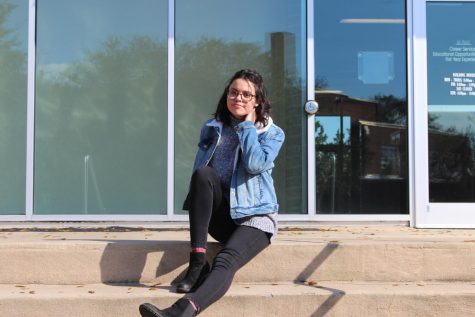
Rachel Rubio, junior Spanish and philosophy double major, always desired to go to college.
“I decided to go because … I really want to do something important with my life, like affect other people. And I felt like going to college was the best way to do that,” Rubio said.
Rubio is from New Jersey, and GS is far away from her home, which is why she was unsure of coming here. However, when she visited a friend going to SCAD, she visited the GS campus.
“I came and I visited and I absolutely loved it,” said Rubio. “I love the campus. I love the southern hospitality. That is not something you find in New Jersey, New York area–people are not as nice. And so I really just love the atmosphere and the culture, and I got accepted into the Honors Program, and they are helping me financially, so that was a very big factor. And it was just where I felt I needed to be and where I could succeed and be challenged.”
Rubio said college didn’t seem attainable because she didn’t believe she’d be able to overcome the loans–she found it scary. However, now she believes she’ll overcome this.
She faced a financial struggle getting into college.
“[My parents] love me and care about me a lot, but they’re not able to support me in that way, really,” said Rubio. “And so I kind of had to decide whether I wanted to take on that burden of loans because they’re real.”
The biggest obstacle getting into college was the application process. Rubio’s parents never went to college, and her brother went to an in-state school that had an easy process.
Rubio struggled with travel expenses and application fees. She didn’t apply to many colleges solely because of the application fee, but she’s happy with where she is.
She had doubted she would get accepted, so when she found out she got accepted into Georgia Southern, she was ecstatic. She added that it was a huge deal, and when she told her family about her acceptance, they were so supportive, posted about her acceptance on social media everywhere and told all their friends.
“I don’t know why I really doubted that that was a possibility,” said Rubio. “But when I did get accepted, I was like, ‘Oh my gosh, I’m actually going to be able to do something important and accomplish something for my family, especially because no one in my family has gone to college. Some of them haven’t even finished high school… Most my family’s in Columbia, South America, and family is a really important aspect in Hispanic culture.”
However, Rubio had anxieties before coming to GS. She went to a small school with a graduating class of around 22 people. She was scared of being away from what was familiar at a much larger school and knowing her parents wouldn’t be able to support her financially like they had before.
Rubio finds herself comparing herself to others who come from a family of college graduates. She said she has a lot of friends whose parents went to college, so they’re familiar with the process like what happens when you go to college and get out of college.
“And I just have a really different experience. And so I’m like, ‘Am I going to be able to succeed in the way that they’re succeeding?’ ‘Am I going to be able to measure up?’” said Rubio.
She also said a lot of people whose parents have gone to college tend to be a little wealthier.
“And so it’s hard…People want to go to like, Mellow Mushroom every night or whatever,” said Rubio. “And that’s just not something I can do, and it’s been hard to say no. And I compare myself often to that as well.”
Rubio feels that first generation college students are “thrown into a parade and expected to know how we’re supposed to succeed.”
She said not being familiar with what she’s supposed to be doing is hard. Financially, it is hard as well because she wants to keep up GPA but also needs money, so she has to get a job.
“Just because it comes with like obstacles doesn’t mean that it’s impossible,” Rubio said.
Rubio’s biggest struggle has been everyone expecting you to figure out your life in four years.
“That’s not how life works,” said Rubio. “You can’t just like say, ‘Okay, this is what I’m going to going to do. And I’m going to do it for the rest of my life.’ … There’s just so much possibility in front of me that it’s kind of hard to stay focused on school when I’m like, ‘What am I going to do after I graduate?’ ”
Rubio started with the TRIO program through SSS her sophomore year, and they paired her with her mentor Penny.
Rubio said her mentor has been a great source of comfort and familiarity throughout college. She said Penny has been a great resource to know what is available to Rubio on campus as a first-generation college student. She said Penny holds her accountable and teaches her what she’s supposed to be doing.
Rubio also likes going to the TRIO talks offered on the campus.
“Even if I don’t learn anything new, being around people that are also going through the same struggles and us verbalizing it, saying it out loud, makes it real and it makes it like I can recognize that there are people who are around me who are also going through the same things and that it’s possible to succeed,” said Rubio.
Rubio also just joined the McNair Scholars Program, which is a post baccalaureate research program that helps you get her Ph.D.
“So it kind of like levels the playing field for first-gen versus non first-gen because you actually know what kind of research you should be doing, when you should be doing it, how to make your resume look…all that basic stuff that you really should be learning in high school, but you don’t,” said Rubio.
Rubio advises high schoolers planning to go to college to ask questions. She said there are no stupid questions, but it’s stupid not to ask.
“Because your parents aren’t gonna know,” said Rubio. “Maybe some parents will, but my parents had no idea. They could not help me at all. And so you need to take the initiative, and if you want to succeed, and for whatever reason you’re going to college, whether it’s because you love academia and you want to just immerse yourself in it or you want to make your parents proud or…whatever the reason is, you need to take the initiative.”
Rubio said she would offer the same advice to first generation college students already in college but also urges them to seek out experiences that will help them grow as a person and academically.
“You know, research might not sound attractive to everyone, but it’s important. So put yourself out there and don’t close yourself off to opportunities.”
What College Means to Her
Rubio said she thinks a lot of times most people think of college as just “more school.” While she admits there’s a lot of truth to that, she describes it as the largest growing experience you’ll ever get. It’s a place where you’re surrounded by people your age who are interested and invested in you.
“And so college is like a place where you’re paying for an experience that will help you grow as a person emotionally, physically, mentally,” said Rubio. “It’s just such a great growing experience. And it’s not just academic. And people like get so focused on their classes and their schoolwork that they forget to spend time with the people who they’re with … like everyone is important and playing a role in your life and just like slow down and take that in because it’s not going to really happen again.”
Fred Smith

Fred Smith, a senior economics major, said college always seemed like it was there for him.
“It was just something I could do if I tried, and I was always motivated by my parents to go try it go do it,” said Smith.
Smith was a part of Upward Bound in high school, which is a TRIO program. Smith said it was a part of his motivation to go to college.
His biggest obstacles getting into college were his test scores because he’s not the best test-taker, so he did the success program at GS.To overcome his obstacles, he tried to study more,attended TRIO Upward Bound and went to SSS.
Smith said there was a financial struggle getting into college because his parents are low-income, but SSS helped him his first year, and he got a job as a Resident Advisor in housing.
He felt relieved after getting into college but still felt a little anxiety because there were a lot of unknowns.
“I felt a sense of relief because I know where I’m going,” said Smith. I know that it’s a good school. I know that I’m here because I want to be, and it was more of a feeling of excitement and a little bit of … anxiety.”
With mentors and help, Smith said he is doing pretty well.
Smith’s biggest struggle in college is time management and staying financially afloat. He’s an RA going to programs, SSS programs and organization meetings along with school.His first year here, he struggled adapting to classes and tried to balance everything. It was a new experience, and he didn’t know what to look for.
Obstacles he is still facing is figuring out what’s next for him, whether that be continuing his education, getting a job or finding the best options for going into entry-level positions.
TRIO has impacted Smith positively, saying that they’re really good at supporting students.
“They’re really good at supporting me, helping to talk to [me about] what I need to do and they’re really good at giving me programs I can go to in order to help me or to help better me in education and help better my lifelong skills.”
He was in TRIO in high school as well and had a positive experience with them, so he joined again in college.
“People at SSS has helped me throughout the way,” said Smith. “They’re really great people, and if you ever needed help or anything, they’re great to go to. And they’re always there to guide you along the way.”
What College Means to Him
“What college means to me is finding ways to better understand the people around you, opening your mind to new ideas and new challenges … and building the soft and hard skills in order for you to build a team and be on a team, be a team player and be a leader as well,” said Smith.
GS Resource:
TRIO Student Support Services
Students are eligible for Student Support Services if they fall under at least one of three qualification: first generation college student, low-income students (who receive the PELL grant,) or a student with a disability.
Penny Hendrix, success coach and mentor at SSS, has been working for the TRIO program since June 2016.
The grant that funds the SSS only allows them to serve 144 students. However, they help more than that on a waiting list. While they cannot give them financial assistance until they’re accepted into the program, they still provide them with all their other services. She said they’re probably serving 150 students currently.
Each participant is assigned a mentor who they meet frequently throughout the semester. They also give grant aid to those who meet the criteria, and they hold group sessions bi-weekly over topics that are pertinent to first generation college students.
“Often when students are first generation, they don’t have anyone at home that can guide them,” said Hendrix. “Financial aid can be very confusing. Scheduling your classes can be very confusing. And while we have advisors and all different people on campus that provide those services, our services are much more one-on-one and intense. And so we never try to be invasive in the lives of our students, but we definitely try to be very involved.”
The biggest obstacle she’s seen first generation college students face is time-management and learning how to get everything in order to meet all the requirements of going to college.
Hendrix said the main goal of the program is “doing whatever it takes to help them achieve their main goal of graduation.”
She has only seen positive affects on those who have taken advantage of the program.
“We have very few students that lose financial aid or whose GPA falls below the required GPA,” said Hendrix. “Most of our students go on to graduate and go on to a master’s program or further. So, I feel like the support that they get here is very encouraging to them.”
Harris started working for Student Support Services in 2016 at Georgia Southern. It was brand new when Georgia Southern was awarded the grant in 2016, and she’s been here since it started.
Over the years, the program has went from just being two or three people to having a whole office. The grant is funded to serve 144 students, and they’ve been able to reach that every year. The program has been able to establish a partnership with many different department on campus, including financial aid, office of multicultural affairs and the Recreational Activity Center (RAC).
Currently, they have about 100 active students.
Harris said they try not to turn a student away. Because they are federally funded, students officially in the program have to meet the criteria, but they are a part of GS, so they try to help everyone. Harris said that every year their graduating class gets bigger and bigger. They went from having maybe one or two students graduate the first year to about 12 who graduate from the program.
“We always tell people that those of us that work in TRIO, we are in the business of retention and graduation,” said Harris. ”So we are here to keep students at Georgia Southern and to get them to graduate from Georgia Southern.”
This article was previously published in the September 2020 print edition of The George-Anne Reflector Magazine.



